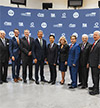Statistics through August 2016 show a strong year for exports in Kentucky. So far, companies have shipped nearly $20 billion worth of products to other countries, placing Kentucky in the top-10 states for export growth. The leading export category is aerospace ($6.9 billion), followed by motor vehicles ($2.4 billion); pharmaceuticals and medicines ($1.2 billion); motor vehicle parts ($1.1 billion; resin, synthetic rubber, artificial and synthetic fibers, and filament ($780 million); and basic chemicals ($522 million).
Aerospace
More than 75 aerospace-related facilities in Kentucky employ 16,000 people. Aerospace is a booming market in the state — exports have increased 145 percent in the past five years. Through August 2016, Kentucky aerospace exports have grown 21 percent over the same period last year, representing more than one third of all the state’s exports.
Kentucky’s aerospace footprint continues to expand. For example, in September 2016 Safran Landing Systems began a $100 million expansion of its facility in northern Kentucky, where it will provide wheel and brake components for Delta, Spirit Airlines, Air Canada, and other airlines.
Another supplier in expansion mode is Meggitt Aircraft Braking Systems (MABS), which will undertake a $9.3 million expansion of its Danville manufacturing and distribution campus in Boyle County, creating 66 jobs. The company will consolidate operations from Ohio and also expand its carbon brake manufacturing capacity.
“Every time we’ve invested in Danville, the community and state have reaffirmed this is the right location for future growth,” says MABS president Luke Durudogan. “As we continue to evaluate our global footprint, we see potential for additional opportunities in Boyle County.”
Automotive
Automakers have been building vehicles, engines, and parts in Kentucky for generations. About 500 auto-related companies operate in the state, employing nearly 100,000 people. Almost $6 billion in automotive-related exports were shipped in 2015, making Kentucky the third-largest auto producer in the country. The industry continues to grow, with nearly 20 new auto-related projects announced in 2016, totaling about $600 million in new investment and 1,500 jobs.
A testament to Kentucky’s long automotive history is Mubea, which manufactures coil springs and stabilizer bars for suspension and handling systems. After locating its initial Kentucky facility in Florence in 1982, Mubea now employs about 1,400 people at six manufacturing facilities totaling more than 1.1 million square feet. In 2013 Mubea opened a state-of-the-art tailored rolled blank advanced manufacturing facility in Boone County, the first of its kind in North America.
Automotive interior vent and trim systems producer Dr. Schneider Automotive Systems — which supplies Bentley, Lamborghini, BMW, Mercedes, Ford, and Volkswagen — recently completed a plant expansion in Russell Springs. In Frankfort, HAHN Automation, which provides custom automation equipment for the automotive industry, has also expanded operations. “Northern Kentucky has been a tremendous source of talented workforce, quality customers, and strong partnerships,” says John Baines, president of HAHN Automation.
Advanced Manufacturing Projects in Kentucky
Advanced manufacturing companies have been making investments and creating jobs across Kentucky.
-
Meggitt Aircraft Braking Systems (MABS)
Danville, KYMeggitt Aircraft Braking Systems (MABS), which will undertake a $9.3 million expansion of its Danville manufacturing and distribution campus in Boyle County, creating 66 jobs.
-
Mubea
Florence, KYIn 2013 Mubea opened a state-of-the-art tailored rolled blank advanced manufacturing facility in Boone County, the first of its kind in North America.
-
Dr. Schneider Automotive Systems
Russell Springs, KYDr. Schneider Automotive Systems — which supplies Bentley, Lamborghini, BMW, Mercedes, Ford, and Volkswagen — recently completed a plant expansion in Russell Springs.
-
HAHN Automation
Hebron, KYIn Frankfort, HAHN Automation, which provides custom automation equipment for the automotive industry, has also expanded operations.
-
Catalent Pharma Solutions
Winchester, KYCatalent Pharma Solutions recently secured a long-term contract with Pfizer to manufacture Nexium at its facility in nearby Winchester.
-
Piramal Pharma Solutions
Lexington, KYPiramal Pharma Solutions will invest $10 million to expand its injectable pharmaceuticals facility in Lexington.
-
Von Allmen Center for Entrepreneurship
Lexington, KYVon Allmen Center for Entrepreneurship at the University of Kentucky targets the commercialization of university research, facilitates academic–private-sector partnerships, and assists entrepreneurs and small businesses in creating jobs.
Pharmaceutical products represent the third-largest manufacturing export in Kentucky. The industry consists of a wide range of companies, including big pharma companies, startups, contract research organizations, and other suppliers.
A highly active pharmaceutical cluster is located in Lexington, Kentucky. Catalent Pharma Solutions recently secured a long-term contract with Pfizer to manufacture Nexium at its facility in nearby Winchester. Piramal Pharma Solutions will invest $10 million to expand its injectable pharmaceuticals facility in Lexington. And biotech start-up Hera BioLabs, also in Lexington, is spending $1.8 million for a new headquarters. “Kentucky is an ideal location for a contract research organization like Hera to start and grow because it offers a competitive edge in manufacturing and is an excellent place to recruit and attract the type of talent we are looking for,” says Jack Crawford, Hera BioLabs CEO.
Northern Kentucky is home to a growing biotechnology cluster with emphasis on pharmaceuticals, medical devices, and biomedical informatics. This region offers an outstanding support structure for startups, including incubators such as bioLOGIC in Covington, which provides scientific and business expertise to life science companies. A recent graduate from bioLOGIC is Bexion Pharmaceuticals, which in November 2015 won the prestigious Tibbetts Award, recognizing the company as a “model of excellence” for the Federal Small Business Innovation Research (SBIR) and Small Business Technology Transfer (STTR) programs.
Support for Advanced Manufacturing
Innovation is the key to advanced manufacturing. Providing support for new ideas and new technologies leads to the formation of startup companies, which are eager to commercialize their products, provide jobs, and contribute to the regional economies — perhaps even starting clusters of related activity.
This, however, often requires funding, infrastructure support, and business leadership skills. To provide these vital components of success, the Von Allmen Center for Entrepreneurship at the University of Kentucky targets the commercialization of university research, facilitates academic–private-sector partnerships, and assists entrepreneurs and small businesses in creating jobs. Also, through the Kentucky Innovation Network, the state further supports entrepreneurs, startups, and small businesses by providing free resources and business and funding expertise.
Perhaps the most pressing concern for Kentucky’s manufacturing industry is the attraction and retention of highly skilled workers. This is especially challenging for key advanced manufacturing sectors, such as aerospace and automotive. Companies thinking of establishing operations in an area want not only highly skilled workers, but also a labor pool large enough to supply workers for future expansions, or if competitors come to town.
"As I travel the state, I hear repeatedly from employers about the shortage of workers with the skills needed to get the job done,” Governor Matt Bevin stated in a recent press release. “Making this problem worse is the fact that Kentucky’s workforce as a percent of its population is currently one of the smallest in the nation.”
To create a robust, highly skilled, and well-trained workforce, Kentucky launched its $100 million Work Ready Skills Initiative in July 2016. Backed by a $100 million statewide bond, the program expands and upgrades career and technical education facilities through local partnerships among private industry and educational institutions. These facilities will then train and educate workers to meet the higher-tech workforce needs of Kentucky’s employers, now and in the future.
“The Work Ready Skills Initiative is an opportunity for private-sector and government partners to jointly ‘move at the speed of business’ to determine best practices for providing world-class training, and then implement those best practices,” states Josh Benton, executive director, Workforce Development for the Kentucky Cabinet for Economic Development. “We will continue to partner with the Education and Workforce Development Cabinet to create an atmosphere where companies can find qualified people, and qualified people can find quality careers.”



